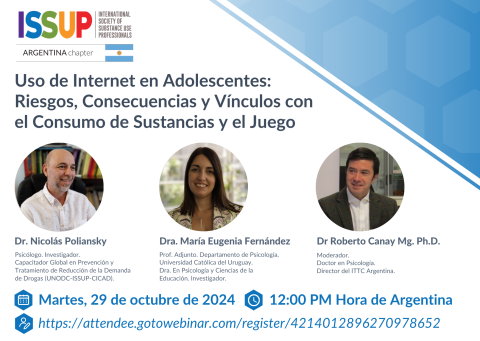Internet Use in Adolescents: Risks, Consequences and Links with Substance Use and Gambling
Spanish

ISSUP Argentina cordially invites you to its webinar on Internet Use in Adolescents: Risks, Consequences and Links with Substance Use and Gambling.
Date: Tuesday, October 29, 2024
Time: 12:00 PM Argentina Time
Register for the webinar
The webinar will focus on analyzing the negative consequences of problematic use of the Internet and social networks during adolescence, and how these effects can generate mental health problems that affect healthy development. Evidence will also be presented on the correlation between this problematic use and the early onset of alcohol and other psychoactive substance use.
In addition, a study carried out in Uruguay on the young population will be presented, which shows the prevalence of gambling in the post-pandemic stage and its relationship with sociodemographic, psychopathological aspects and psychological well-being. Comparisons were made based on gender and geographic area.
The discussion will include...
-
Prevalence of Internet connectivity in electronic devices in the country and in the region (LATM).
-
How and how much do teenagers use electronic devices?
-
What do we use them for? Do we have evidence that its use can have harmful consequences?
-
Emerging problems of the problematic use of electronic devices.
-
What are the risks of the Internet and social networks for teenagers?
-
Neurobiological substrate of behavioral addictions and substance addictions.
-
Are there similarities between substance addictions (alcohol, marijuana, etc.) and behavioral addictions?
-
Can the use of electronic devices generate addiction (gaming and online betting)?
-
Can problematic use of electronic devices predispose to early onset of alcohol and drug use in adolescence?
-
Comorbidity between pathological gambling and psychopathological syndromes.
-
Risk and protection factors in pathological gambling.
Target audience:
- Although the webinar is aimed at all people who work in the field of Mental Health and Addictions, the participation of youth leaders is important.
Learning outcomes:
Following the webinar, attendees will be able to:
-
To examine the prevalence and patterns of electronic device use among adolescents, highlighting the associated risks and harmful consequences.
-
Learn about the similarities between behavioral addictions and substance use addictions, and how the use of electronic devices can lead to addiction or early drug use.
-
Explore emerging issues related to the use of electronic devices, including links to gambling and associated risk factors.
References:
-
Abel Nogueira-López, Antonio Rial-Boubeta, Ignacio Guadix-García, Víctor J. Villanueva-Blasco Jöel Billieux (2023). Prevalence of problematic Internet use and problematic gaming in Spanish adolescents. Elsevier, Psychiatry Research.
-
Billieux, J., Schimmentic, A., Khazaal, Y., Mauragea, P., & Heerena, A. (2015). Are we overpathologizing everyday life? A tenable blueprint for behavioral addiction research. Journal of Behavioral Addictions, 4, 119123.
-
Brand, M., Wegmann, E., Stark, R., Müller, A., Wölfling, K., Robbins, T. W., & Potenza, M. N. (2019). The interaction of person-affect-cognition-execution (I-PACE) model for addictive behaviors: update, generalization to addictive behaviors beyond Internet-use disorders, and specification of the process character of addictive behaviors. Neuroscience & Biobehavioral Reviews, 104, 1-1
-
Díaz-Aguado, M.J., Martín-Babarro, J., Falcon, L., 2018. Problematic Internet use, ́ maladaptive future time perspective and school context. Psicothema 30 (2), 195–200
-
Grant, J. E., Potenza, M. N., Weinstein, A., & Gorelick, D. A. (2010). Introduction to behavioral addictions. American Journal of Drug and Alcohol Abuse, 36, 233-241.
-
Goldstein, R. Z., & Volkow, N. D. (2011). Dysfunction of the prefrontal cortex in addiction: neuroimaging findings and clinical implications. Nature Reviews Neuroscience, 12, 652-669.
-
Méndez-Gago, S., González-Robledo, L. (2018). Use and abuse of Information and Communication Technologies by adolescents: a representative study of the city of Madrid. Camilo José Cela University of Madrid.
-
Pedrero-Pérez, E. J., Ruiz-Sánchez de León, J. M., Rojo-Mota, G., Llanero-Luque, M., Pedrero-Aguilar, J., Morales-Alonso, S., & Puerta-García, C. (2018). Information and Communication Technologies (ICT): abuse of the Internet, video games, mobile phones, instant messaging and social networks through MULTICAGE-TIC. Addictions, 30, 19-32.
-
Pedrero-Pérez, E., Morales-Alonso, S., Gallardo-Arriero, V., Blázquez-Rollón, L., & Ruiz-Sánchez, J. (2021). Impulsivity-compulsivity axis in the abuse of information and communication technologies (ICT) from the perspective of the research domain criteria (RDoC) project. Behavioral Psychology / Psicología Behavioral, Vol. 29, No. 2, 2021, pp. 399-415.
-
World Health Organization (WHO 2019). International Classification of Diseases ICD 11.
Presenters:
Dr. Nicolás Poliansky.
Psychologist. Researcher. Member of the Argentine Chapter of ISSUP. Global Trainer in Drug Demand Reduction Prevention and Treatment (UNODC-ISSUP-CICAD).
Master Trainer of the Colombo Plan, Drug Advisory Programme (DAP), CHILD Programme (Child Intervention for Living Drug-Free). Associate Professor at UMSA.
Dr. María Eugenia Fernández.
Assistant Prof. Department of Psychology, Catholic University of Uruguay. PhD in Psychology and Education Sciences. Researcher. Member of ISSUP and ICUDDR.
Moderator:
Dr Roberto Canay Mg.
Doctor of Psychology (Summa Laude Graduate) PhD - Univ del Salvador. Argentina.
Director of ITTC Argentina.
Webinars and online events presented and hosted by the International Society of Substance Use Professionals (ISSUP) are provided for informational purposes only. They are educational in nature and do not constitute medical advice, diagnosis, or treatment.